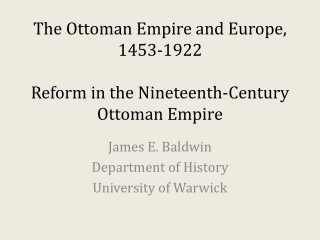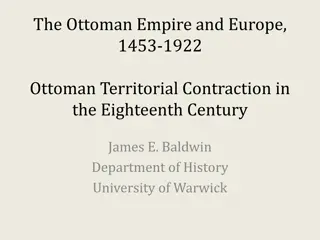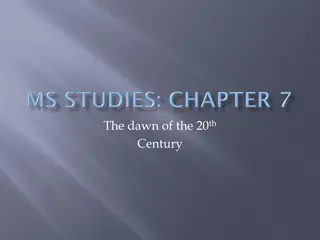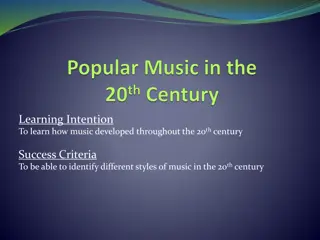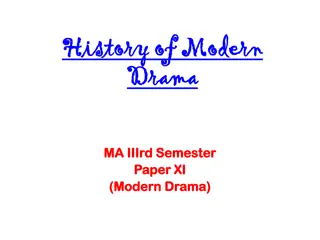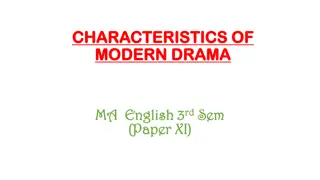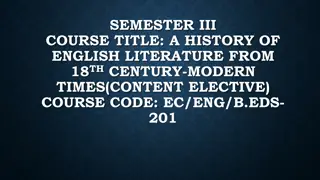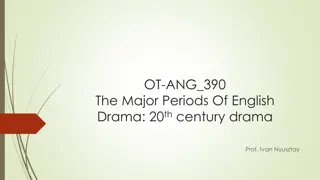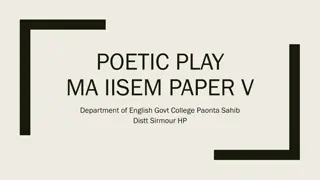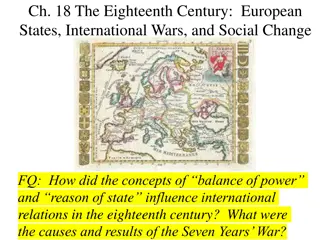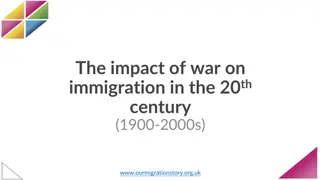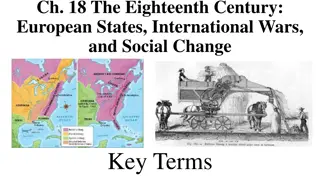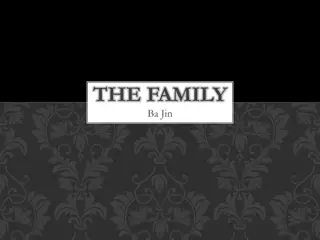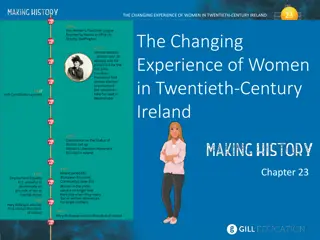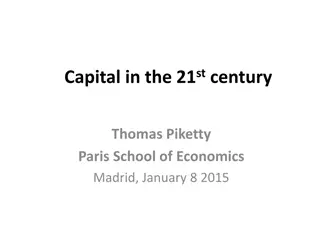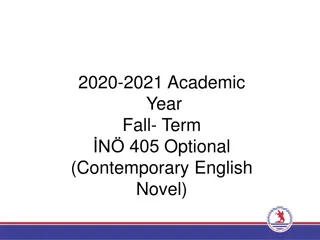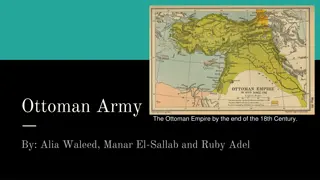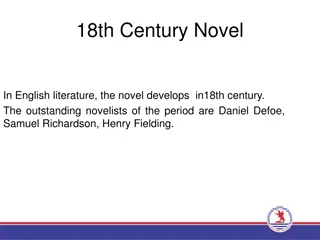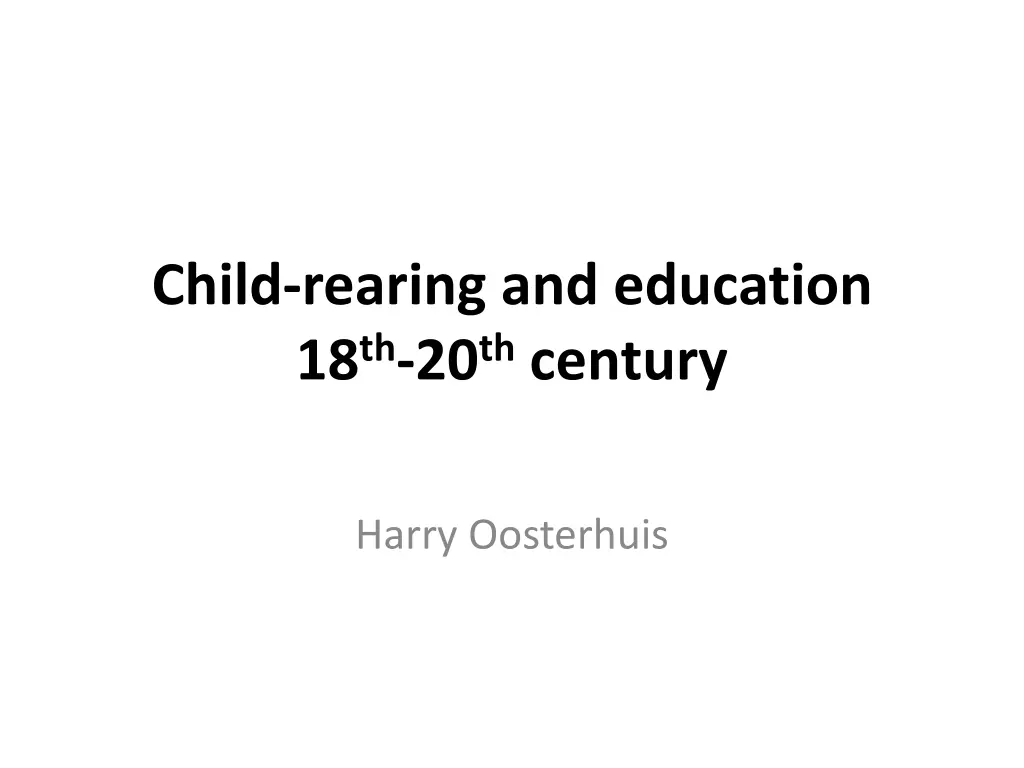
Evolution of Education: Feral Children and Pedagogy Exploration
Explore the intriguing history of feral children and their impact on education and pedagogy from the 18th to the 20th century. Discover the role of research, the significance of stories, and various viewpoints on nature versus nurture in child development and education.
Download Presentation

Please find below an Image/Link to download the presentation.
The content on the website is provided AS IS for your information and personal use only. It may not be sold, licensed, or shared on other websites without obtaining consent from the author. If you encounter any issues during the download, it is possible that the publisher has removed the file from their server.
You are allowed to download the files provided on this website for personal or commercial use, subject to the condition that they are used lawfully. All files are the property of their respective owners.
The content on the website is provided AS IS for your information and personal use only. It may not be sold, licensed, or shared on other websites without obtaining consent from the author.
E N D
Presentation Transcript
Child-rearing and education 18th-20thcentury Harry Oosterhuis
What is the role of research into feral children in thinking about education? Why was there so much interest among scholars in the Wild Boy of Aveyron and what was the background of these scholars? Which role do stories about feral children play in the development of pedagogy? How are they related to the nature-nurture (inborn ideas, abilities versus tabula rasa) discussion and thinking about the development (through certain stages; the development of language and symbolic thinking) of children? How do modern researchers in developmental psychology and pedagogy think about these children?
What are feral children and why have they raised interest? Stories about feral children (realities and myths): Children raised by wolves or other animals. Children who have grown up in isolation in forests (Wild Boy of Aveyron). Children isolated and/or held in captivity in society (Genie). The interest for feral children throws light on the historically changing ways of thinking about: - what makes human beings human; - the boundary between humans and animals; - human development and the influence of child-rearing, education and socialization to what extent can human beings be designed? - the role of nature and culture/nurture; - evolutionary perspectives on human beings: the wild child as an atavism, a return of what primitive man might have been before the development of culture.
Various views on feral children Early modern period: feral children undermined the idea of man with God- given innate ideas (ideae innatae); the idea that human nature has been made by God. Enlightenment: Empiricism (Locke): child as tabula rasa and the possibility of compensatory education: human beings are open for development and improvement; Naturalism (Carl Linaeus): wild children compared to animals, as an intermediate stage between primates and human beings. 19th century: nature-nurture discussion Are the defects of feral children caused by social isolation or were these children mentally defective to begin with and was the isolation a consequence of these defects? (Both perspectives to be found in the discussion about the Wild Boy of Aveyron.) Present-day wild children: in fact children who have been locked up and isolated Explanations in terms of modern developmental psychology which focus on the sequence and irreversibility of certain developmental stages (related to the growth of the brain) and the importance of social interaction to stimulate abilities (language, symbolic thinking, having a theory of mind : imagining that others have intentions and feelings).
Pinels and Itards view of the Wild Boy of Aveyron Physician (alienist) Philippe Pinel (mental asylum): Victor is a congenital idiot, who cannot be cured . Physician and pedagogue Jean Itard (Institute for Deaf-Mutes): Victor is like a deaf- mute and can be educated into a normal human being. One of the earliest empirical reports about a pedagogical experiment. (Pedagogy used to be philosohical and followed historical examples. Rousseau s Emile, ou de l ducation (1762): one of the first imagined pedagogical experiments.) Itard (and Pinel) belonged to the Ideologues putting into practice the educational implications of sensualist philosophy: Man born without innate ideas and shaped by the environment Wild children (and in fact any primitive man) can be socialized and cultivated through a compensating education in order to make good what they had missed and to repair defects.
The central role of education in enlightenment thinking about man (1) Traditional (religiously inspired) assumptions about children: man is burdened by original sin children are born wicked, if not evil education is disciplining, breaking the will of the little tyrants and keeping the little bastards under. (Historic paintings of children with dogs and parrots upbringing as training and they should imitate adult behavior.) Enlightened pedagogical optimism: - man as a being who which is inherently good and the child as an innocent and pure soul, who can be shaped; - education of children as the key to the improvement and progress of mankind.
The central role of education in enlightenment thinking about man (2) John Locke (Some thoughts concerning education, 1693) Jean-Jacques Rousseau ( mile, ou de l ducation, 1762): - the child s inner nature as essentially good and not spoilt by original sin; - the goal of education: the unfolding of individual nature and the cumulative improvement of abilities and qualities; - a positive and stimulating rather than negative and repressive education; - the mind as a tabula rasa the child is malleable: shaping children through linking their will and desire to sensations of pleasure and pain on the basis of encouragement and reasonable correction and persuasion. Locke: I think I may say, that of all the Men we meet with, Nine Parts of Ten are what they are, Good or Evil, useful or not, by their Education. Rousseau: Everything what man is, is the product of upbringing and education. Kant: Man can only become human through education; he is nothing but what education makes out of him.
Rousseaus educational ideal - Child-rearing = fostering the unfolding of the child s innate unspoiled nature and authentic essence and removing all impediments to such development. - The natural goodness of children is vulnerable and should be protected against bad influences from artificial and corrupt society Virtue can be created out of the child s essentially good nature if he is shielded from the distorting influence of society, learns from concrete experience and his introduction to adult responsibilities, abstract thinking and social conventions is postponed until he has developed a robust character.
Historical context of Rousseaus educational model Traditional society: children represented as little adults and integrated in the social world of adults at an early age, as soon as they were able to work and contribute to economic resources and the household income; children were an economic investment, also for old age. The modern (and middle class) notion of the particular nature of the child as a separate category and childhood as a distinct episode in life that should be devoted to development and schooling (and play) in order to prepare for adult life and that children should be guided and protected, in the first place by their nurturing mother in the nuclear family (the safe and warm haven in a heartless world).
Rousseaus educational paradox - Education geared to the spontaneous, free unfolding of the child s unspoiled nature. - Innocent children should be constantly guarded, protected, watched and observed in order to shield them from the corrupting influence of society. No unlimited freedom for the child to do what it likes and wants, but rather a panoptical pedagogical model: disciplining through the internalization of norms and values the molding of a robust conscience and self-control as part of the child s own character. - Tension between restraint and active interference as a recurrent central issue in the history of modern upbringing and education Demand from uncertain parents for expert advice in order to find the delicate balance between the free unfolding of the child s authentic nature and protecting it against supposedly harmful influences and the need for guidance and control.
Rousseaus influence on early 19th-century educational theory and school-reform Heinrich Pestalozzi s school-reform: learning not based on disciplining the child but the cultivation of its individuality in order to become a harmonious human being. Johann Herbart: learning based on the child s world of experience and developing its mental and cognitive capacities in cumulative stages.
The failure of Itards experiment: undermining of Enlightened optimism The failure to learn Victor the use of language and abstract symbolic thinking which are the preconditions for cognitive development limitations of sensualist philosophy and the suggestion that at a certain age the lack of linguistic competence and symbolic thinking cannot be repaired. Victor s arrested emotional development: not surpassing the childish stage of narcissism and egocentrism; inability to identify with another person, which is the basic mental precondition for meaningful social interaction and communication. Other examples which more or less were in line with Itard s findings: 1724: Peter, the wild boy of Hannover: never learned to talk. 1828: Kaspar Hauser in Nuremberg: acquired speech but had difficulty of speaking in the first person, confused dreams with reality and had trouble to grasp the idea of his reflection in the mirror (no sense of self).
Naturalist perspective focusing on innate development Criticism of empirical and sensualist idea of children as malleable More nuanced view of for example the naturalist Blumenbach: development of the child depends on interaction between environment and an inherent nisus formativus, an active, teleological shaping force Teleological idea that the development of the child is at least partly internally programmed, that the child has to pass through certain successive developmental stages and that education has to be geared to these cumulative phases: nurture depends on nature. Feral children lack normal nisus formativus and therefore education will hardly make a difference.
Modern theories on the linguistic skills and symbolic competence of children Acquiring language is connected to the physiological development of the brain (language skills as hard-wired ). The child s development proceeds through successive, qualitative steps and depends on the interaction between innate, physiological and environmental and communicative influences Delicate and complex co- evolution of organic developmental stages and stimulation through social interaction. If certain stages of socialization are not realized when the physical make- up of the child s brain is still malleable, the basic mental skills will never be acquired, and the later stages will be impossible to achieve the irreversibility of developmental processes because they depend on the organic development of the child s brain. The case of Genie around 1970: object of psycholinguistic research failure to learn Genie linguistic and communicative skills.
Linguist Chomsky versus behaviorist Skinner Naom Chomsky: the ability to learn language depends on inborn linguistic competences which are related to the structural features of the brain. Burhuss F. Skinner: linguistic skills are shaped through learned behavior on the basis of conditioning. The famous experiment by Laura-Ann Pettito, who tried to learn the chimpanzee Nim Chimsky sign language. Although he managed to learn the use of many signs, she could not prove that he really learned language, because the chimpanzee was not able to combine signs and use them in a flexible and creative way and therefore did not acquire a crucial element of linguistic competence.
How did pedagogical ideals and norms change in the 20th century and what was the role of educational expertise? Which different currents and changes can be distinguished in pedagogy; what are the continuities and discontinuities? What was the relation between educational experts and their advice and parents? What are the underlying views of the child in pedagogical theories?
Increasing role of expertise in the field of childrearing (1) The growing importance of (mandatory and institutionalized) schooling in modern industrial and urbanized society the development of a school-system with professionalized teachers and other pedagogical and psychological experts, pushing back the role of clergymen and philosophers and supplementing the family. Late 19thcentury: introduction of compulsory primary schooling. Background: - Requirements of the increasingly specialized labor-market in an increasingly complex and differentiated society. - Democratization and nation-building: raising responsible and self-controlled citizens who shared basic knowledge, skills (common language, arithmetic) and values.
The modern school-system Professionalisation: teaching on the basis of educational theory and expertise and rudimentary psychological knowledge about the mental development of children. Differentiation of the intellectual level of pupils in schools the class-system based on age-groups. Norms and standards about the intellectual development of children related to age: assessment, measurement of achievement and selection through regular testing and (standardized) examinations. Special schools and classes and psycho-educational arrangements for weak pupils with learning-difficulties and milder forms of retardation (Heilp dagogik, clinical child and adolescent studies, orthopedagogiek ) increasing psychological involvement in education.
Increasing role of expertise in the field of childrearing (2) The growing attention for health and hygiene and interference with problem - children (late 19thand early 20thcentury): Pediatrics: physical health and hygiene (public health and social medicine) medical services in schools and child health centers: regular health check-ups of children and medical advice for mothers. Social and state-supported initiatives to improve the lot of deprived children: banning of child labor, philanthropic welfare schemes and social work to promote proper child-rearing practices. Institutionalized care for (detention of) and re-education of orphans, street children and young delinquents. Legal measures to protect children against parental neglect, maltreatment and abuse. Mental health Child Guidance Clinics for treating children with all kinds of developmental, relational and mental difficulties. Professionalisation: philanthropists, clergymen and lawyers social workers, doctors, psychiatrists, and psychologists.
Increasing role of expertise in the field of childrearing (3) First decades of the 20thcentury: increasing focus on the mental and emotional development of children and youths, which boosted the influence of psychology in childrearing: Stanley Hall : pedagogy on the basis of psychological knowledge of children s development; puberty and adolescence as crucial and precarious stages in the development from childhood into adulthood. Arnold Gesell and Jean Piaget: normative scales to assess children s cognitive and emotional development. Traditional emphasis on the need to build moral character psychological standards with respect to the development of a balanced and well-adjusted personality increasing psychologisation of childrearing and education popular educational advice on the basis of the idea that raising children was anything but simple and self-evident, but required serious attention from parents, in particular mothers. Motherhood manuals and parenting guides (adopted by self-conscious and well-educated middle-class parents): How to Have Cheerful Kids (1927) and Child Training: The Pathway to Happiness (1948) Increasing uncertainty among parents: am I doing the right thing for my child with regard to his/her well-being and future success and happiness? growing dependence on expert advice.
The influence of psychoanalysis The psychic development of children conditioned by hidden unconscious processes which were related to the way parents interacted with them. Parents (mothers) needed knowledge about the emotional development of their children and psychological skills in order to safeguard their mental health and stimulate the formation of their personality. The importance of emotional ties between mother and child, the primacy of the mother-child symbiosis for future social functioning. Babies want attention; they probably need plenty of it . Mothers should be available for their child day and night. John Bowlby: the importance of affective attachment between mother and child the duty of mothers to focus their attention on the emotional well-being of their children and act as a guide for the child to pass all the necessary mental and emotional stages in its development. Each child poses a risk for mental problems and disorders (neurosis, traumas and inner conflicts) and parents (mothers in particular: Bowlby s theory of maternal deprivation ) could be blamed for them, which entailed that not only children with psychological problems but also their parents were targeted for therapeutic interventions.
The influence of behaviorism John B. Watson, The psychological care of the infant and child, (1928): Childrearing should be based on objective scientific approach and planning: mechanistic method of habit training through systematic conditioning Children can be shaped. Children should be prepared for harsh reality, the adult world of work, achievement and competition Childrearing should not rely on the irrational mother-instinct and sentimental and emotional maternal love. Behaviorist model did not catch on: it was antagonistic to the well-established and generally idealized family as the natural childrearing setting and egalitarian and democratic values, which set the tone in childrearing after the postwar period. Popularity of more relaxed and pragmatic approach of Benjamin Spock.
Spocks liberal and pragmatic educational philosophy Benjamin Spock (The common sense book of baby and child care / The pocket book of baby and child care, 1946): - Optimistic interpretation of Freud s psychoanalysis and the influence of humanistic psychology: children viewed as essentially reasonable and manageable. - As natural child raisers, mothers should trust and rely on their own insights and capacities. - They should adopt a flexible permissive and tolerant attitude towards their child, while at the same time not sacrificing their own needs for those of the child. (However, at the same time the implicit norm that mothers should devote their lives to nurturing children.)
Ambivalent relation between experts and parents However, continuing doubts among experts whether parents/mothers can meet the requirements of a sound education ambivalent framing of parent-/motherhood: on the one hand mothers are viewed as natural educators and considered to be responsible for their children; on the other hand, they have to learn how to be/become good child raisers and therefore they are in need of professional support the psychological approach fosters uncertainty among parents/mothers, the more so because experts cannot/do not want to impose their knowledge and take responsibility away from parents who are increasingly well-informed and proto-professionalized .
Cognitive psychology and re-medicalization 1960s: psychoanalysis cognitive-psychological approach focusing on intellectual development (reflecting the increasing importance of schooling and preventing that children lag behind). 1980s: partly re-medicalization emphasizing the significance of constitutional factors in the development of children, their temperament and acquisition of language. (Genetics, prenatal diagnosis and medical approach of mental and emotional disorders, such as autism and ADHD (massive prescription of Ritalin).)
Pedagogical theories and practices: models of self-development until 1930s control, will-power, moral awareness, and a sense of discipline implies unconditional adaptation of the individual to fixed social norms and values. 1930s-1960s guided self-development : personality , implying psychological standards and guidelines more self- responsibility for self-development the ideal of internalising social norms and values in an autonomous self through subtle psychological negotiation. from the 1960s on spontaneous self-development : free self-realisation, personal growth and emotional self- expression social barriers for the expression of the authentic and assertive self should be removed permissiveness, anti-authoritarian childrearing. adaptive self-development : character : self-
The dilemmas of permissive parenting Permissive, anti-authoritarian child-raising: the emotional unfolding and well-being of the child as a goal in itself; the environment has to adapt to the needs of the child as a being with its own will and rights; talking, explaining and (endless) negotiating are the modern democratic pedagogical strategies. Complicating the role of parents: They are supposed to be available for the child, to consider its needs and well- being, and to stimulate its optimal development and schooling, but they should not discipline or shape the child. Can children deal with the freedom which is offered to them in modern education? spontaneous self-development as a risky obstacle course, where anything can go wrong along the way and which raises a lot of uncertainty among parents about how far their permissibility should go and at what point they should draw a line (childrearing as risk-control). The pampered child syndrome : the spoilt child, who doesn t know of any boundaries because it assumes that everything is negotiable, who is egocentric and irresponsible, who cannot deal with disappointments because it has only heard praise for anything it does, and who in fact is not prepared for the requirements of the adult world (and neoliberal achievement society).
Critical voices Increasing demand for expert advice which, however, cannot provide certainty: Expert advice is versatile, contradictory and leaves the final decision to parents no solution for uncertainty and doubt. Implicit norms of experts reinforce parental uncertainty and insecurity and even fuel new worries mothers struggling with anxiety and feelings of guilt about their role as educators, because they have internalized certain ideals of the perfect parent while at the same time they cannot meet the (continuously raised) standards which are suggested by the experts. J. Harris (1998). The Nurture Assumption: Why Children Turn Out the Way They Do. F. Furedi (2001). Paranoid parenting: Why ignoring the experts may be best for your child. J. Warner (2005). Perfect madness: Motherhood in the age of anxiety. The influence of parents has been overrated since a large part of the socialization of the child takes place outside of the nuclear family, in particular in the interaction with other children.

